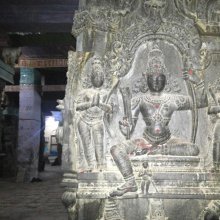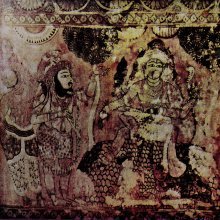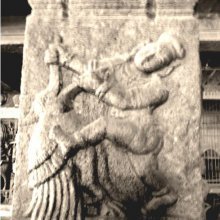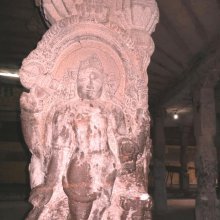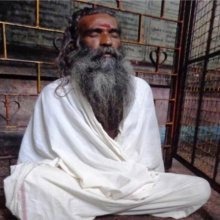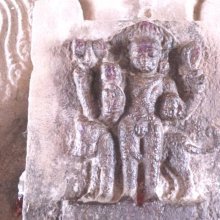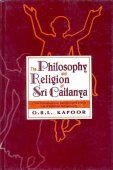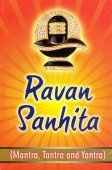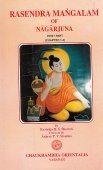Him, Hiṅ, Hin, Hiṃ: 8 definitions
Introduction:
Him means something in Buddhism, Pali, Hinduism, Sanskrit, Jainism, Prakrit, Hindi. If you want to know the exact meaning, history, etymology or English translation of this term then check out the descriptions on this page. Add your comment or reference to a book if you want to contribute to this summary article.
Images (photo gallery)
(+190 more images available)
In Buddhism
Tibetan Buddhism (Vajrayana or tantric Buddhism)
Source: OSU Press: Cakrasamvara SamadhiHiṃ (हिं) is the bīja associated with Himālaya, according to the Cakrasaṃvara-maṇḍala or Saṃvaramaṇḍala of Abhayākaragupta’s Niṣpannayogāvalī, p. 45 and n. 145; (Cf. Cakrasaṃvaratantra, Gray, David B., 2007).—The Cakrasaṃvara mandala has a total of sixty-two deities. [...] Three concentric circles going outward, the body, speech and mind wheels (kāya-vāka-citta), in the order: mind (blue), speech (red), and body (white), with eight Ḍākinīs each in non-dual union with their Ḍākas, "male consorts".
Associated elements of Khagānanā and Virupākṣa:
Circle: vākacakra [=vākcakra?] (speech-wheel) (red);
Ḍākinī (female consort): Khagānanā;
Ḍāka (male consort): Virupākṣa;
Bīja: hiṃ;
Body-part: scrot./lab. [scrotum/labia?];
Pīṭha: Himālaya;
Bodily constituent: sīmanta (hair line);
Bodhipakṣa (wings of enlightenment): vīryabodhyaṅga (awakening of effort).

Tibetan Buddhism includes schools such as Nyingma, Kadampa, Kagyu and Gelug. Their primary canon of literature is divided in two broad categories: The Kangyur, which consists of Buddha’s words, and the Tengyur, which includes commentaries from various sources. Esotericism and tantra techniques (vajrayāna) are collected indepently.
Languages of India and abroad
Sanskrit dictionary
Source: Cologne Digital Sanskrit Dictionaries: Monier-Williams Sanskrit-English DictionaryHiṅ (हिङ्):—ind. the lowing sound or cry made by a cow seeking her calf, [Ṛg-veda i, 164, 28.]
Source: Cologne Digital Sanskrit Dictionaries: Monier-Williams Sanskrit-English Dictionary1) Him (हिम्):—1. him ind. an exclamation (interchangeable with hiṅ, q.v.)
2) 2. him (only in [instrumental case] himā), [column] d, frost, hoar-frost, snow, [Ṛg-veda x, 37, 10; 68, 10.]
[Sanskrit to German]
Sanskrit, also spelled संस्कृतम् (saṃskṛtam), is an ancient language of India commonly seen as the grandmother of the Indo-European language family (even English!). Closely allied with Prakrit and Pali, Sanskrit is more exhaustive in both grammar and terms and has the most extensive collection of literature in the world, greatly surpassing its sister-languages Greek and Latin.
Hindi dictionary
Source: DDSA: A practical Hindi-English dictionaryHim in Hindi refers in English to:—(nm) snow, ice; frost; ~[kamduka] a snow-ball; ~[kana] a snow-particle; ~[kara] the moon; ~[kala] ice age; ~[kshetra] snowfield, ~[giri] the Himalayas; —[cadara] an ice-sheet; ~[cchada] an ice-cap; -[jhamjhavata] a snow-storm; ~[nada] an esker; ~[nadi] a glacier, an ice-river; ~[pumja] an ice-pack; ~[pata/prapata] ice/snow-fall; ~[baddha] ice-bound, snow bound; ~[badhita] ice/snow-bound; -[manava] snow-man; ~[yuga] the ice-age; ~[lava] snow flakes; —[rekha] snow-line; ~[lamba] icicle; ~[vartika] icicle; ~[varsha] freezing rain; snow fall; ~[vrishti] snow-fall; ~[shikhara] ice-cap; ~[shaila] an iceberg; ~[shveta] snowhite; -[samcaya/samghata] a snow-heap; ~[sagara] an ice-sea; -[sphatika] ice-crystal..—him (हिम) is alternatively transliterated as Hima.
...
Prakrit-English dictionary
Source: DDSA: Paia-sadda-mahannavo; a comprehensive Prakrit Hindi dictionaryHīṃ (हीं) in the Prakrit language is related to the Sanskrit word: Hrī.
Prakrit is an ancient language closely associated with both Pali and Sanskrit. Jain literature is often composed in this language or sub-dialects, such as the Agamas and their commentaries which are written in Ardhamagadhi and Maharashtri Prakrit. The earliest extant texts can be dated to as early as the 4th century BCE although core portions might be older.
Kannada-English dictionary
Source: Alar: Kannada-English corpusHiṃ (ಹಿಂ):—
1) [adjective] (in composition) at the rear or back; behind; back.
2) [adjective] distant or remote.
3) [adjective] of or for a time in the past.
4) [adjective] in a backward direction; returning; reversed.
Source: Alar: Kannada-English corpusHiṃ (ಹಿಂ):—
1) [adjective] (in composition) at the rear or back; behind; back.
2) [adjective] distant or remote.
3) [adjective] of or for a time in the past.
4) [adjective] in a backward direction; returning; reversed.
--- OR ---
Hiṃ (ಹಿಂ):—
1) [noun] the rear or hinder part of anything.
2) [noun] that which is of, belongs to, happened in, the past.
3) [noun] the time that has gone by; days, months or years gone by; the past.
4) [noun] what has happened; the history, former life or experiences of a person, group or institution.
--- OR ---
Hiṃ (ಹಿಂ):—
1) [noun] the rear or hinder part of anything.
2) [noun] that which is of, belongs to, happened in, the past.
3) [noun] the time that has gone by; days, months or years gone by; the past.
4) [noun] what has happened; the history, former life or experiences of a person, group or institution.
--- OR ---
Hin (ಹಿನ್):—
1) [adjective] (as a first element in composition) at the rear or back; behind; back.
2) [adjective] distant or remote.
3) [adjective] of or for a time in the past.
4) [adjective] in a backward direction; returning; reversed.
--- OR ---
Hin (ಹಿನ್):—
1) [noun] the rear or hinder part of anything.
2) [noun] that which is of, belongs to, happened in the past.
3) [noun] the time that has gone by; days, months or years gone by; the past.
4) [noun] what has happened; the history, former life or experiences of a person, group or institution.
Kannada is a Dravidian language (as opposed to the Indo-European language family) mainly spoken in the southwestern region of India.
See also (Relevant definitions)
Starts with (+641): Him-champa, Him-him, Hima, Hima-marubhumi, Himabaluka, Himabha, Himabhanu, Himabhas, Himabhra, Himabhubhrit, Himabhudhara, Himabja, Himacalagriha, Himacalaprishtha, Himacalapura, Himacalasuta, Himacalavilasini, Himacalendra, Himacandra, Himacandrashila.
Ends with (+185): Abharavashim, Adakushim, Adhim, Adhimbidhim, Adhimmadhim, Adhinnamadhim, Adoshimpadoshim, Afim, Ahe Ahe Nahim Nahim, Ahe-ahe-nahim-nahim, Ahirnishim, Aishim, Ajadivasim, Ajavarshim, Akshabokshim, Akshambokshim, Amshim, Anandemshim, Arthaarthim, Ashimpashim.
Full-text (+11126): Hinkara, Hims, Apahimkara, Abhihinkara, Hikkartri, Pratihimsa, Vihimsra, Abhitigmarashmi, Upahims, Himsira, Pratyavarudhi, Tvadrik, Himsya, Suhims, Abilam, Himsana, Himsaka, Hikkriya, Pracodana, Paravarya.
Relevant text
Search found 516 books and stories containing Him, Hīm, Hīṃ, Hiṅ, Hin, Hiṃ; (plurals include: Hims, Hīms, Hīṃs, Hiṅs, Hins, Hiṃs). You can also click to the full overview containing English textual excerpts. Below are direct links for the most relevant articles:
Chandogya Upanishad (Shankara Bhashya) (by Ganganatha Jha)
Section 2.2 (second khaṇḍa) (three texts) < [Chapter 2 - Second Adhyāya]
Section 2.21 (twenty-first khaṇḍa) (four texts) < [Chapter 2 - Second Adhyāya]
Section 2.9 (ninth khaṇḍa) (eight texts) < [Chapter 2 - Second Adhyāya]
Satapatha-brahmana (by Julius Eggeling)
Kanda I, adhyaya 4, brahmana 1 < [First Kanda]
Kāṇḍa IV, adhyāya 5, brāhmaṇa 9 < [Fourth Kāṇḍa]
Kāṇḍa IV, adhyāya 4, brāhmaṇa 4 < [Fourth Kāṇḍa]
Chandogya Upanishad (Madhva commentary) (by Srisa Chandra Vasu)
First Adhyaya, Twelfth Khanda (4 mantras)
First Adhyaya, Thirteenth Khanda (3 mantras)
Bharadvaja-srauta-sutra (by C. G. Kashikar)
Rig Veda (translation and commentary) (by H. H. Wilson)
Baudhayana Dharmasutra (by Georg Bühler)
Related products
(+30 more products available)
